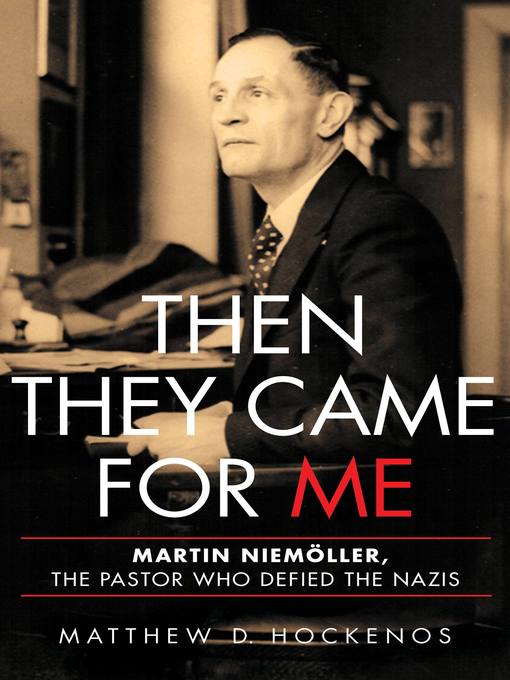
Then They Came for Me
Martin Niemöller, the Pastor Who Defied the Nazis
کتاب های مرتبط
- اطلاعات
- نقد و بررسی
- دیدگاه کاربران
نقد و بررسی

July 1, 2018
The tale of German pastor Martin Niemöller (1892-1984), whose writings have become central documents of liberation theology.The title of this sometimes-plodding but useful biography derives from Niemöller's most famous writing, a poem that includes the lines "first they came for the Communists, and I did not speak out--because I was not a Communist....Then they came for me--and there was no one left to speak for me." As Hockenos (Twentieth Century History/Skidmore Coll.; A Church Divided: German Protestants Confront the Nazi Past, 2004) chronicles in the serviceable narrative, Niemöller was a man of contradictions: He commanded a submarine in World War I and was so embittered by Germany's loss that he refused to deliver his vessel to the Allies to be scrapped. Though a pastor who joined the clergy so that "he could serve God and country with little worry about interference from the state," he was an enthusiastic supporter of Hitler and the Nazi regime. That changed when Hitler decided to turn the Protestant church in Germany into a Nazified extension of the state; Niemöller objected to the policy but not to National Socialism itself, even as he organized resistance to the Nazified church. He was imprisoned and sent to Dachau, and though treated better than most political prisoners, he would almost certainly have been murdered at the end of the war had his SS jailers not decided to "use their valuable cargo to negotiate their own survival." By a curious twist, Niemöller was saved from the SS by members of the regular German army, who knew that defeat was at hand. His political evolution occurred after the war, when he condemned anti-Semitism and became a civil rights activist and confidant of Martin Luther King's. "More and more in the 1950s and '60s," writes Hockenos, "he began to draw connections between pacifism, anticolonialism, and racial justice."The writing lacks flair, but Niemöller's story is a valuable study in individual resistance to tyranny.
COPYRIGHT(2018) Kirkus Reviews, ALL RIGHTS RESERVED.

July 23, 2018
History professor Hockenos (A Church Divided: German Protestants Confront the Nazi Past) provides a “revisionist” biography of Martin Niemöller (1892–1984), the dissident German Lutheran pastor best known for his postwar confession from which the book’s title is taken. He shows Niemöller as a staunch German nationalist up to and during the Third Reich—he voted for the Nazis in three elections, offered to serve in the German navy in 1939, and “showed contempt for groups he deemed anti-Christian and anti-German”—who also paid a heavy price for courageously resisting attempts to Aryanize the church: he was “Hitler’s prisoner” from 1937 to 1945 in two concentration camps, including years of solitary confinement. Still, the Confessing Church, the dissident wing of the Lutherans that Niemöller helped lead, was concerned only with the persecution of the churches and had little to say about the increasingly lethal persecution of the Jews. Hockenos shows that, after the war, Niemöller came to renounce German nationalism, slowly becoming a pacifist and acknowledging the Protestant Church’s history of anti-Semitism and silence during the Holocaust. But his credibility in the last decades of his life was undermined by his naïveté about the evils of Soviet communism. Hockenos’s impressively nuanced study captures a major 20th-century religious leader and his contradictions. Agent: Rob McQuilkin, MMQLIT Agency.

August 1, 2018
"First they came for the Communists, and I did not speak out--because I was not a Communist... Then they came for me--and there was no one left to speak for me." These words by German Lutheran pastor Martin Niemöller (1892-84) have been widely used to support many social injustice protests, but few know the man behind the text. Using extensive research, Hockenos (history, Skidmore Coll.; A Church Divided) writes a nuanced, well-rounded analysis of Niemöller's transformation from fervent nationalist and supporter of the Nazi regime to opponent of Hitler's attempts to control the Lutheran Church in Germany. After his arrest and imprisonment in concentration camps for his opposition, Niemöller continued to attract controversy following World War II during his visits to the United States. Some believed his actions were akin to Martin Luther; others felt he was unapologetic about his nationalism. VERDICT Best suited for researchers, especially those interested in the history of the Lutheran Church or the history of Germany around the time of World War II.--Terri Lent, Patrick Henry High Sch., Ashland, VA
Copyright 2018 Library Journal, LLC Used with permission.

























دیدگاه کاربران